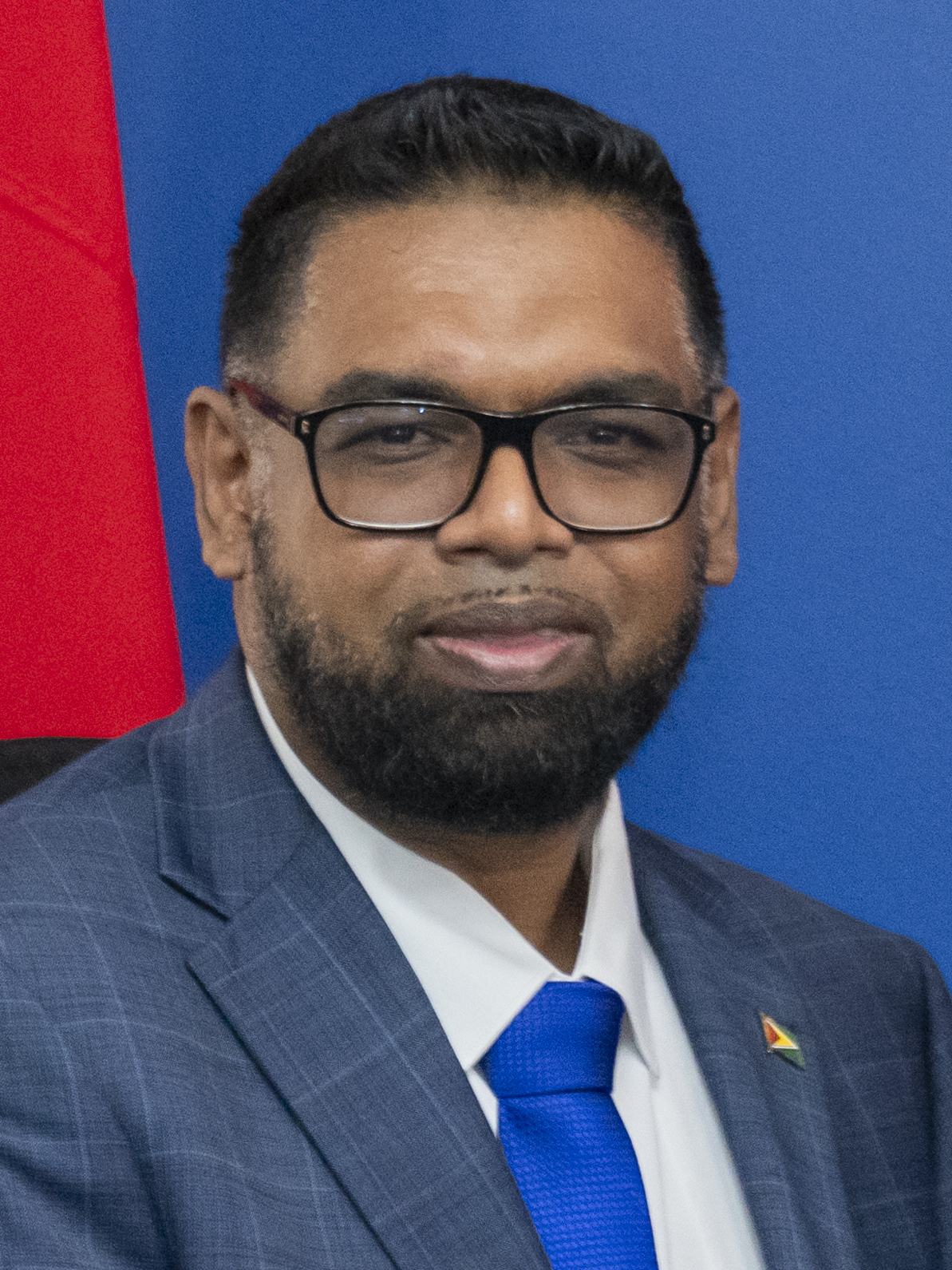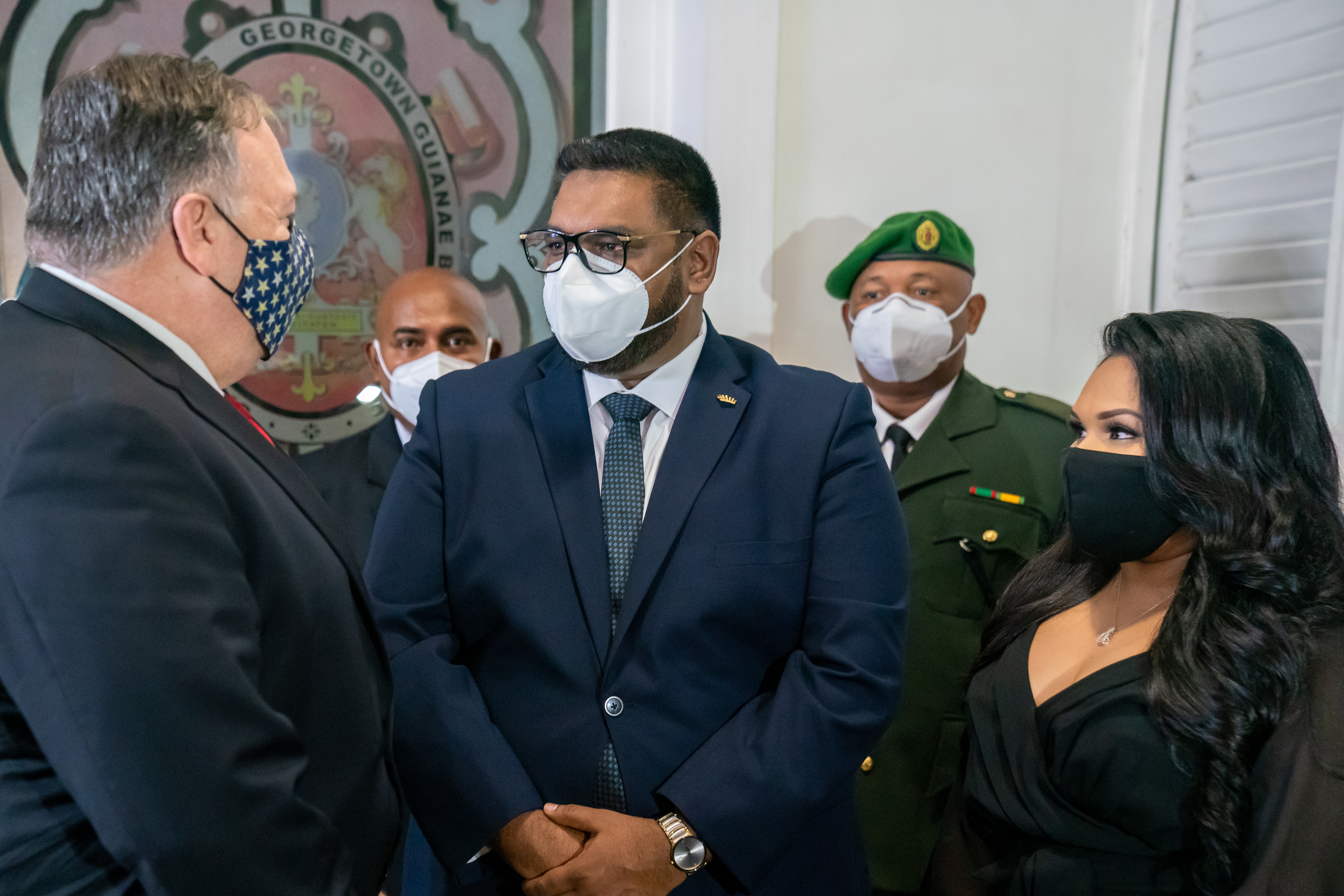1. Overview

Mohamed Irfaan Ali (born April 25, 1980) is a Guyanese politician who has served as the tenth and current President of Guyana since August 2, 2020. A prominent member of the People's Progressive Party/Civic (PPP/C), he previously held ministerial portfolios as Minister of Housing and Water from 2009 to 2015. Ali holds historical significance as the first Muslim president of Guyana and the second Muslim head of state in the Americas, following Noor Hassanali of Trinidad and Tobago. His presidency began after a protracted electoral process involving legal challenges and a recount of all ballots following the March 2020 general election.
2. Early life and education
Mohamed Irfaan Ali's early life and educational journey laid the foundation for his political career, rooted in a family dedicated to education and a pursuit of higher learning across various disciplines.
2.1. Early life and family background
Ali was born on April 25, 1980, in Leonora, a village located in the Essequibo Islands-West Demerara region of Guyana. He hails from an Indo-Guyanese Muslim family; both of his parents, Bibi Shariman Neshaw and Mohamed Osman Ali, were educators. As one of two sons, Ali spent many of his formative years on Leguan Island. His ancestry traces back to his maternal great-great-great grandparents, Ujiari and Bujhawan, who originated from Basi village, Telogepur thana, in Basti jela, present-day Uttar Pradesh, India. They, along with their son Dildar and four other children and a daughter-in-law, immigrated to what was then British Guiana in 1894 as indentured laborers aboard the ship Rhine. They were indentured to Plantation Success in Leguan.
2.2. Education
Ali completed his primary education at Leonora Nursery and Primary schools and Cornelia Ida Primary. He then pursued his secondary education at St. Stanislaus College in Georgetown, Guyana.
For his higher education, Ali obtained a doctorate in Urban and Regional Planning from the University of the West Indies. In 2003, he earned a Master's degree in Human Resource Planning Development from the National Institute of Labour Economics, affiliated with the Guru Gobind Singh Indraprastha University in New Delhi, India, which later awarded him an Honorary Doctorate in 2023. His academic qualifications also include a Master of Arts degree in manpower planning, a post-graduate diploma in international business, and a post-graduate certificate in finance from Anglia Ruskin University. He also holds a Master of Law degree in international commercial law from the University of Salford and a Bachelor of Arts degree with honours in business management from the University of Sunderland.
3. Career
Ali's career trajectory showcases his progression from professional roles in development and planning to a significant presence in Guyanese politics, culminating in his rise to the presidency.
3.1. Professional career
Prior to his entry into politics, Ali held several professional positions. He served as a project manager within the Caribbean Development Bank's Project Implementation Unit, which operated under the Ministry of Finance. Additionally, he worked as a senior planner in the State Planning Secretariat, contributing to national development strategies.
3.2. Early political career
Ali began his political career in 2006 when he became a member of the National Assembly of Guyana. His parliamentary tenure led to significant ministerial appointments. He served as Minister of Housing and Water from 2009 to 2015 and also held the portfolio of Minister of Tourism Industry and Commerce. During his time as a minister, Ali occasionally performed the functions of both President and Prime Minister on separate occasions. When the People's Progressive Party/Civic (PPP/C) transitioned into opposition in 2015, Ali remained an active figure, serving as the chair of the Public Accounts Committee and co-chair of the Economic Services Committee of the parliament of Guyana.
4. Presidency
Mohamed Irfaan Ali's path to the presidency was marked by a competitive election and a focus on economic transformation and strategic foreign relations.
4.1. Presidential candidacy and election
Ali was officially selected as the presidential candidate for the People's Progressive Party/Civic (PPP/C) on January 19, 2019, for the March 2, 2020, general and regional elections in Guyana. His selection occurred amidst charges of conspiracy and fraud brought against him by Guyana's Special Organized Crime Unit (SOCU). Ali's legal team maintained that these charges were politically motivated and "trumped up," and they had not reached a full court hearing at the time of his candidacy.
The 2020 general election was followed by extensive legal challenges concerning its integrity and a subsequent recount of all electoral ballots, which delayed the official declaration of results for several months. Despite these challenges, Ali was sworn in as Guyana's tenth president on August 2, 2020. The fraud charges against him were ultimately dismissed on August 14, 2020.
4.2. Campaign platform and policies
Ali's 2020 presidential campaign centered primarily on an economic platform. He highlighted declining economic growth and increased joblessness under the previous Granger administration. A key promise of his campaign was the creation of 50,000 new jobs over five years. He also emphasized the critical need for transparency and adherence to globally recognized standards within Guyana's burgeoning oil sector, which is anticipated to significantly transform the nation's development. Ali committed to establishing a sovereign wealth fund that would be "protected against political interference" and to strengthening Guyana's capacity to uphold the Santiago Principles and the global requirements of the Extractive Industries Transparency Initiative.
4.3. Foreign policy
Under President Ali's leadership, Guyana has pursued key foreign policy initiatives, particularly strengthening security cooperation with the United States. In September 2020, in a joint statement with then-U.S. Secretary of State Mike Pompeo, Ali announced that Guyana and the United States would commence joint maritime patrols. These patrols were specifically aimed at drug interdiction near Guyana's disputed border with crisis-stricken Venezuela. This agreement was reached as U.S. oil majors, including Exxon Mobil Corp and Hess Corp, were increasing crude output from Guyana's substantial offshore Stabroek block, a significant portion of which lies in waters claimed by Venezuela. Both Pompeo and Ali emphasized that "greater security, greater capacity to understand your border space, what's happening inside your Exclusive Economic Zone - those are all things that give Guyana sovereignty."

5. Controversies and allegations
Mohamed Irfaan Ali has faced accusations regarding his academic qualifications and alleged financial misconduct, which were subsequently addressed by the legal system.
During his presidential candidacy, Ali was accused of academic fraud. Opponents claimed that in his early twenties, he had misrepresented one of his qualifications. Separately, Ali was indicted on 19 charges of fraud and conspiracy. These charges alleged that he defrauded the state of over 174.00 M USD between 2011 and 2015 by conspiring with unknown persons to "greatly undersell" 19 plots of state lands located at Plantation Sparendaam and Goedverwagting in Demerara-Mahaica to current or former government officials. According to the Special Organized Crime Unit (SOCU), the lands, which were sold for 39.80 M USD, were valued at 212.40 M USD. The trial for these matters was postponed multiple times, and Ali was granted self-bail. On August 14, 2020, the charges against him were dismissed.
6. Awards and honors
Mohamed Irfaan Ali has received several significant national and international recognitions for his contributions to politics, community welfare, and regional cooperation.
- In 2023, the Government of India conferred the Pravasi Bharatiya Samman (Overseas Indian Award) upon Ali. This honor recognized his substantial contributions in "Politics/Community Welfare" and for his "outstanding achievements both in India and abroad," celebrating his heritage and impact.
- Also in 2023, the Government of Barbados awarded Ali the Order of Freedom of Barbados. This prestigious award was given in recognition of his strong commitment to enhancing cooperation aimed at achieving regional integration and fostering deeper social and economic partnerships, particularly in relation to Food and Nutrition Security, and for his efforts towards the upliftment of the people of Barbados and the broader Caribbean region.
7. Significance
Mohamed Irfaan Ali's presidency holds considerable historical and symbolic significance for Guyana and the broader Americas. His election marked a pivotal moment as he became Guyana's first Muslim president. This achievement also positioned him as the second Muslim head of state in the Americas, following Noor Hassanali, who served as President of Trinidad and Tobago. His rise to the highest office provides symbolic representation for minority communities within Guyana, reflecting the nation's diverse demographic fabric. Beyond this symbolic importance, Ali's leadership has influenced Guyana's political landscape, particularly through his emphasis on economic development and transparency in the burgeoning oil sector. His foreign policy initiatives, including strengthened ties with the United States, also underscore his broader impact on regional integration and international relations.